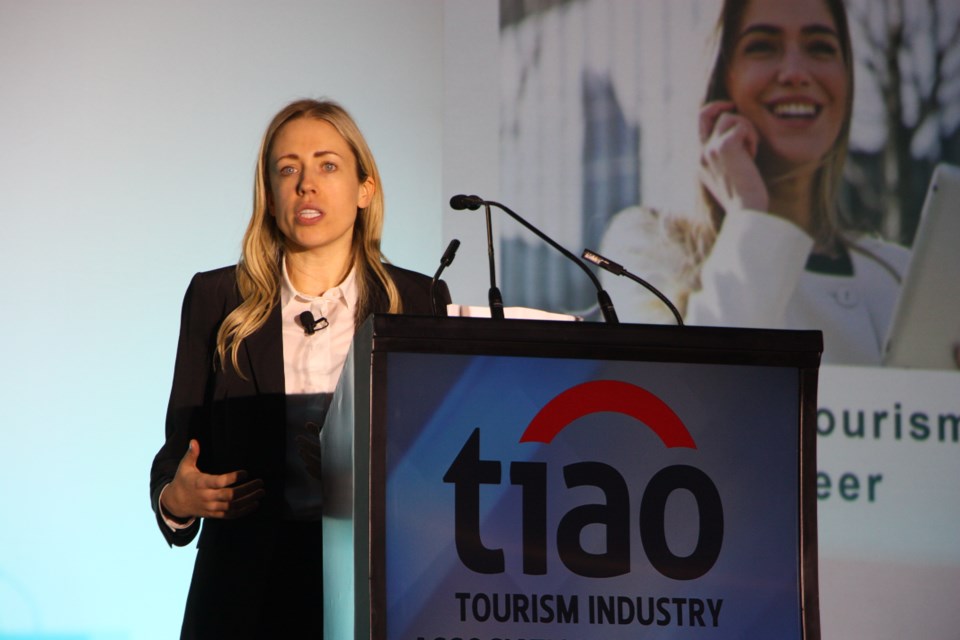More than eight months after news of a human trafficking ring whose victims were working at local resorts broke, the crisis is still shaking up the tourism industry province-wide.
The 2019 Ontario Tourism Summit was at Blue Mountain today and yesterday and included a session this morning on crisis in the industry. Labour trafficking took up most of the discussion with James Henry, vice-president of hospitality at Blue Mountain Resorts, sharing the resort’s experience.
“Even talking about it today, I still feel shocked, I still feel mortified that we were involved in an event that affected so many people,” said Henry.
On Feb. 5, 2019, police announced a pre-dawn raid on a human trafficking ring led to the rescue of 43 victims. Police called it a “modern-day slavery” operation. Later more details emerged, the workers came from Mexico on the promise of a job. The company, RTL Services that contracted the workers to local hospitality jobs, produced proof of legal documentation to work in Canada and had proof their staff were covered under WSIB.
Police reported the victims lived in poor conditions, their wages were mostly withheld, and the workers had to pay a fee for accommodation and transportation.
“We were oblivious to their plight … we determined it was meant to be that way. They were programmed,” said Henry during the tourism summit session. “It’s not to justify … it tells you how difficult it is for an organization not looking for it, to find there is something going on that’s amiss.”
In an interview with CollingwoodToday, Henry said the revelation of how the contract workers were living and being treated triggered a comprehensive review of their standard procedures.
“It made us dive deeper into what we thought were reasonable procedures and due diligence,” said Henry.
The resort sought a certification program through MCIS Language Services, a company supported by the Ontario ministry of the attorney general, which focused on the indicators of sex and labour trafficking.
The resort also used the Westin brand model for training and rolled it out to all the hospitality staff across the resort.
“It’s a question of looking for signs more with the contractors as opposed to the employees,” said Henry.
The resort now trains everyone in hospitality – including temporary contract workers – on their rights under the employment standards act, and their rights specifically as contract workers.
Not only is the resort vetting the recruiters who offer contract labour, but they’re also now vetting all contractors including suppliers to find out if they are using contract labour.
“We will ask for their employment contracts with their employees,” said Henry.
Since February, Blue Mountain Resorts has used very few temporary contract workers from recruitment agencies. Henry said they’ve been working with two recruiters who were former employees and have a long-standing relationship with the resort for contract workers on long-weekends or particularly busy days.
“It’s not nearly to the extent we have in the past,” he said. “Contract labour is the last resort.”
Instead, the resort has “put a lot of hard work” into other staffing options.
According to Henry, Blue Mountain has increased staff housing, and now offers 225 beds for seasonal employees. They also successfully completed an application to qualify for the federal government-run Temporary Foreign Workers Program.
Previous changes to the program in 2014 left hospitality out of the mix of industries allowed to access the program.
Henry said the resort started the application process before learning about the victims of the alleged labour trafficking operation.
Currently, Blue Mountain’s hospitality department employs 30 temporary foreign workers on one-year visas from Barbados.
Henry said the resort is in direct contact with a government agency in Barbados to hire the workers, and they are directly employed by Blue Mountain Resorts (not on contract). They are paid the same wages as any Canadian workers in the same positions.
To qualify, the hospitality department had to prove its efforts to fill the positions in Canada first.
Blue Mountain Resort recruits about 1,000 workers for seasonal positions twice annually.
“I’m a huge fan of the [Temporary Foreign Workers] program,” said Henry. It’s been the difference between a successful and an unsuccessful summer season.”
Alexandra Rodgers, director of research and policy for the Tourism Industry Association of Ontario said the rise in labour trafficking can be connected to Ontario’s labour shortage crisis.
“More industries than ever are really dependent on the availability of temporary labour,” said Rodgers. “While the government has created pathways to bring workers from all over the world, they do not regulate the recruiters who do that. That has led to the rise of this unscrupulous and illegal recruitment across all sectors in Canada.”
Rodgers said it’s increasingly hard to tell who is a good and bad recruiter.
“[Bad recruiters] will advertise or recruit for a job that doesn’t exist … they’ll put workers in substandard and unsafe housing … they have an extreme amount of control over the workers,” said Rodgers. “They will charge employers and then double charge workers for the accommodation.”
She encouraged the tourism industry to do all it can to learn about red flags when it comes to contract labour recruiters.
The Ontario Tourism Summit wraps up this evening with a tourism awards gala.
